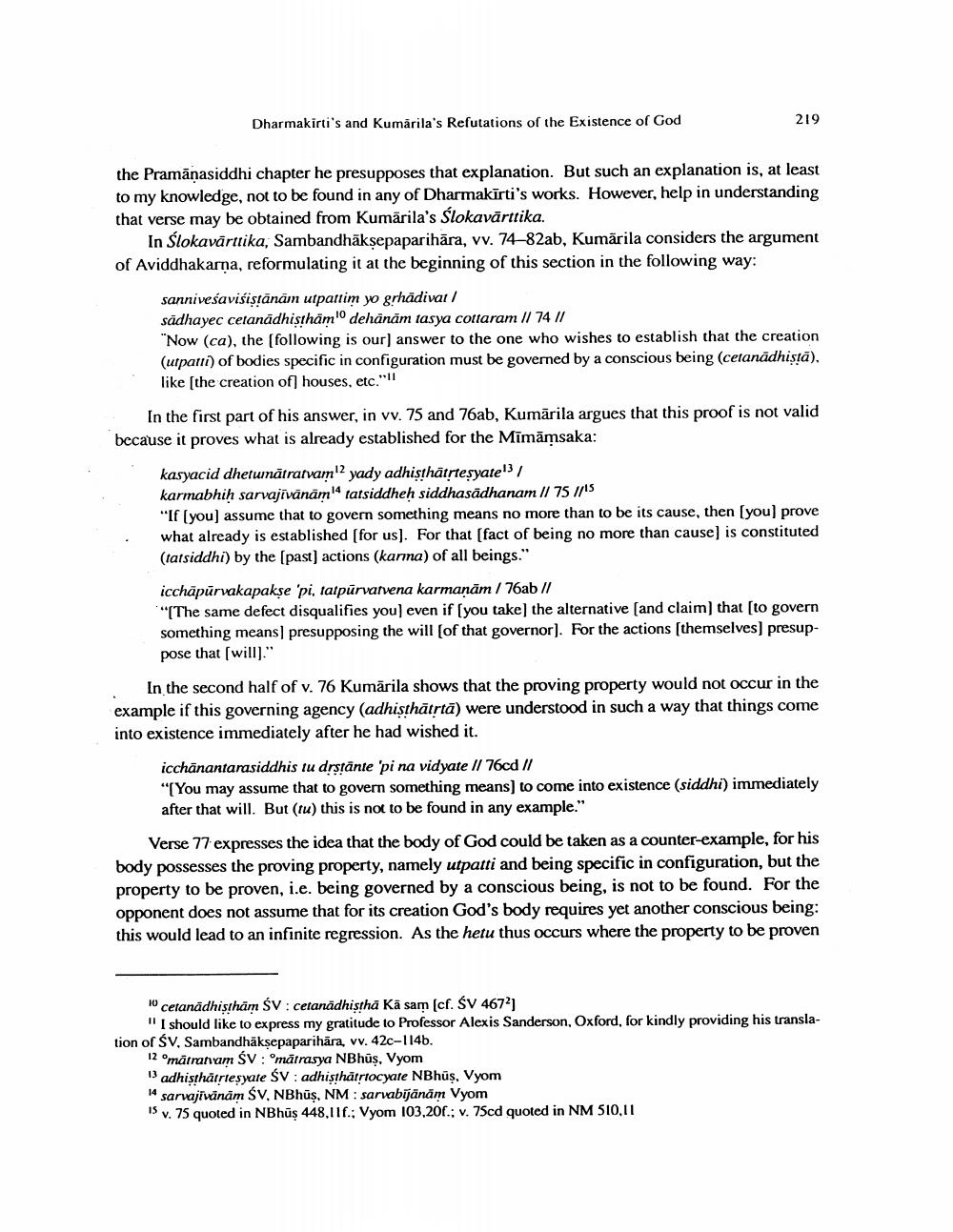________________
Dharmakirti's and Kumarila's Refutations of the Existence of God
219
the Pramanasiddhi chapter he presupposes that explanation. But such an explanation is, at least to my knowledge, not to be found in any of Dharmakirti's works. However, help in understanding that verse may be obtained from Kumārila's Ślokavārttika.
In Slokavärttika, Sambandhākṣepaparihāra, vv. 74-82ab, Kumārila considers the argument of Aviddhakarna, reformulating it at the beginning of this section in the following way:
sannivesavisiṣṭānām utpattim yo grhädivat/
sādhayec cetanādhisthām dehānām tasya cottaram || 74 ||
"Now (ca), the [following is our] answer to the one who wishes to establish that the creation (utpatti) of bodies specific in configuration must be governed by a conscious being (cetanadhiṣṭā), like [the creation of] houses, etc."'ll
In the first part of his answer, in vv. 75 and 76ab, Kumārila argues that this proof is not valid because it proves what is already established for the Mīmāmsaka:
kasyacid dhetundtratvam yady adhisthätṛteryate3/
karmabhiḥ sarvajivānām tatsiddheḥ siddhasadhanam || 75 1/15
"If [you] assume that to govern something means no more than to be its cause, then [you] prove what already is established [for us]. For that [fact of being no more than cause] is constituted (tatsiddhi) by the [past] actions (karma) of all beings."
icchāpūrvakapakṣe 'pi, tatpūrvatvena karmanām / 76ab //
"[The same defect disqualifies you] even if [you take] the alternative [and claim] that [to govern something means] presupposing the will [of that governor]. For the actions [themselves] presuppose that [will]."
In the second half of v. 76 Kumarila shows that the proving property would not occur in the example if this governing agency (adhisthātṛtā) were understood in such a way that things come into existence immediately after he had wished it.
icchanantarasiddhis tu drstante 'pi na vidyate // 76cd //
"[You may assume that to govern something means] to come into existence (siddhi) immediately after that will. But (tu) this is not to be found in any example."
Verse 77 expresses the idea that the body of God could be taken as a counter-example, for his body possesses the proving property, namely utpatti and being specific in configuration, but the property to be proven, i.e. being governed by a conscious being, is not to be found. For the opponent does not assume that for its creation God's body requires yet another conscious being: this would lead to an infinite regression. As the hetu thus occurs where the property to be proven
10 celanadhisthām ŚV: cetanadhisthā Kā sam [cf. ŚV 4672]
"I should like to express my gratitude to Professor Alexis Sanderson, Oxford, for kindly providing his translation of SV, Sambandhākṣepaparihāra, vv. 42c-114b.
12 mätratvam ŚV: matrasya NBhus, Vyom
13 adhisthätṛtesyate SV: adhisthatṛtocyate NBhus, Vyom
14 sarvajivānām SV, NBhūs, NM: sarvabijänām Vyom
15 v. 75 quoted in NBhus 448,11f.; Vyom 103,20f.; v. 75cd quoted in NM 510,11




